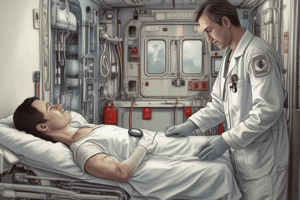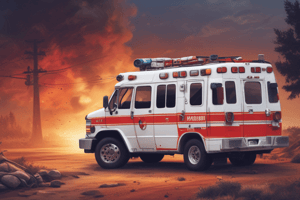Podcast
Questions and Answers
What should you direct your partner to do when assessing a patient with difficulty breathing and a history of emphysema, hypertension, and congestive heart failure?
What should you direct your partner to do when assessing a patient with difficulty breathing and a history of emphysema, hypertension, and congestive heart failure?
administer oxygen with the appropriate device.
What is the MOST accurate definition of dyspnea?
What is the MOST accurate definition of dyspnea?
Shortness of breath or difficulty breathing.
What happens when the level of arterial carbon dioxide rises above normal?
What happens when the level of arterial carbon dioxide rises above normal?
respirations increase in rate and depth.
When administering supplemental oxygen to a hypoxemic patient with chronic lung disease, what should you do?
When administering supplemental oxygen to a hypoxemic patient with chronic lung disease, what should you do?
Which of the following statements regarding anaphylaxis is correct?
Which of the following statements regarding anaphylaxis is correct?
Hyperventilation could be associated with all of the following, except:
Hyperventilation could be associated with all of the following, except:
What are common signs and symptoms of acute hyperventilation syndrome?
What are common signs and symptoms of acute hyperventilation syndrome?
What should you do for a 21-year-old female with slow, shallow respirations after an apparent narcotic overdose?
What should you do for a 21-year-old female with slow, shallow respirations after an apparent narcotic overdose?
What should you do for a 22-year-old female patient complaining of dyspnea and numbness after an argument?
What should you do for a 22-year-old female patient complaining of dyspnea and numbness after an argument?
What should you do for a 62-year-old man with severe respiratory distress and an oxygen saturation of 82%?
What should you do for a 62-year-old man with severe respiratory distress and an oxygen saturation of 82%?
Flashcards are hidden until you start studying
Study Notes
Respiratory Assessment and Interventions
- Administer oxygen to a conscious elderly patient with breathing difficulties, especially in cases with a history of emphysema, hypertension, and congestive heart failure.
- Dyspnea refers to shortness of breath or difficulty breathing, a common symptom in respiratory conditions.
- Elevated levels of arterial carbon dioxide lead to increased respiratory rate and depth as the body attempts to normalize gas levels.
- When administering oxygen to hypoxemic patients with chronic lung diseases, adjust flow rates for symptom improvement and be prepared for assisted ventilation.
Anaphylaxis and Hyperventilation
- Anaphylaxis features airway swelling and hypotension, posing a serious medical emergency that requires immediate intervention.
- Hyperventilation is commonly not associated with narcotic overdose, emphasizing the need for differential diagnosis.
- Symptoms of acute hyperventilation syndrome include tachypnea and tingling in extremities, indicating an imbalance in carbon dioxide levels.
Management of Overdose and Dyspnea
- For a suspected narcotic overdose in a semiconscious patient with shallow respirations, insertion of a nasopharyngeal airway and initiation of assisted ventilation are critical.
- In cases of dyspnea accompanied by numbness and tingling, providing reassurance and oxygen is essential for patient comfort and stabilization.
- In a patient with severe respiratory distress and low oxygen saturation, applying a continuous positive airway pressure (CPAP) device, monitoring blood pressure, and observing for changes are vital steps in managing respiratory failure.
Studying That Suits You
Use AI to generate personalized quizzes and flashcards to suit your learning preferences.



